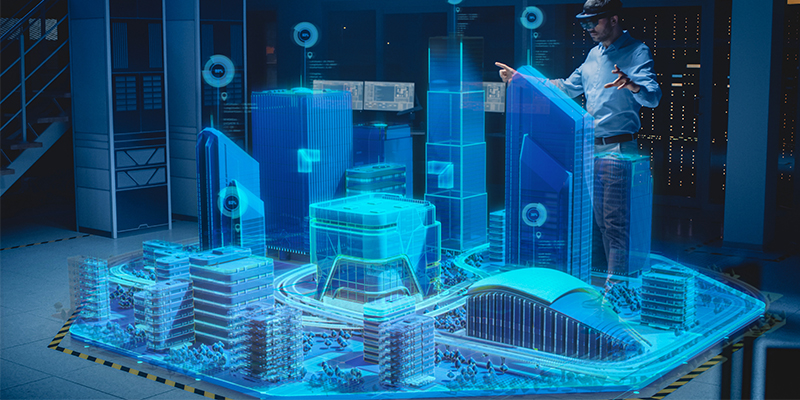The potential for artificial intelligence (AI) to transform businesses, industries and society has been mounting for decades, but recent advancements have moved the science from niche to mainstream. The technology’s proficiency in writing, drawing, coding and composing has driven corporate leaders to consider both the opportunities and threats that AI presents for their future.
For commercial real estate, it’s clear that strategically embracing AI could transform the sector. In JLL’s 2023 Global Real Estate Technology Survey, investors, developers and corporate occupiers ranked AI and generative AI among the top three technologies expected to have the greatest impact on real estate over the next three years. Less clear, however, are the details of what exactly comes next. Respondents indicated the least understanding of AI and generative AI when compared to other surveyed technologies such as blockchain, virtual reality and robotics.
AI has the power to transform commercial real estate
When technology allows people to achieve the same productivity level in less time, more time is freed up for people to create new areas of opportunity. Goldman Sachs draws on a study by MIT economist David Autor to reveal that more than 85% of employment growth in the U.S. over the last 80 years is explained by the technology-driven creation of new positions.
Additionally, according to Microsoft CEO Satya Nadella, AI service providers are making the conscious choice to explore a human-centric approach, developing “co-pilot” products designed to assist people, as opposed to “auto-pilot” products that aim to entirely replace human roles. This positions AI as a significant productivity booster.
Commercial real estate is set to feel these effects. Past technological advances have shaken the real estate industry along five major axes and artificial intelligence is poised to do the same:
- Geolocation: AI companies and investments have been observed to cluster around established tech markets. Going forward, growth is likely to be concentrated in locations where AI talent is available, namely tech hubs, innovation centers and universities.
- Altered demand among assets: AI development calls for more and better data centers, energy grids and connectivity infrastructure.
- New asset and product types: The birth of the “real intelligent building” is imminent. AI-compliant infrastructure will become a default just as internet connections are a default feature of current buildings. AI will also help deliver net-zero buildings with high sustainability performance.
- Revenue and investment: AI-powered underwriting and processes will enable faster transactions and more efficient understanding of properties and markets, catalyzing investments at a global scale. AI-compliant infrastructure and the ability to plug in multiple systems could also enable the expansion of “space as a service” models and new revenue streams for landlords and developers.
- Design and space function: AI will allow for experience-driven design and highly customizable environmental settings.
AI will advance the technological transformation that prop tech began
The real estate industry has begun to proactively embrace and adopt new technologies. In JLL’s tech survey mentioned above, over 80% of real estate occupiers, investors and developers revealed that they plan to increase their real estate technology budget in the next three years.
A maturing prop tech ecosystem powers this adoption. There are now technological solutions for almost all aspects of real estate functions, including investment management, design and construction, building and facility operations and portfolio management – laying a solid foundation for AI integration.
Emerging use cases cover client communication assistance in leasing and property management, design optimization, and knowledge extraction to better govern the complete property lifecycle.
According to a recent report from Research Dive, the construction industry is expected to invest heavily in AI startups and the adoption of cloud-based technologies. The report predicts this heavy investment will generate $8 billion in revenue from the sector by 2031, with most revenue coming in the final five years. JLL’s Artificial Intelligence: Real Estate Revolution or Evolution? Report also shows that AI-powered prop tech tools are already seeing significant investment — about $4 billion in 2022 — driving the development of real estate applications using AI.
AI will drive smarter construction
The construction sector is poised to invest heavily in new smart technologies to address a host of issues that went from troublesome to critical during the pandemic.
Using current and emerging technologies, most of the AI opportunities for construction fall within the project management realm and have less direct applications to the physical act of construction. Offsite, preconstruction, managing compliance and scheduling are ripe for AI assistance, improving speed and accuracy while minimizing the burden on staff. Onsite, technologies range from augmented realities (AR) that can significantly increase efficiency in terms of costs, labor, management time and resources at job sites, to emerging robotics that help alleviate physical strain of construction labor.
One example of AR technology that can be used to assist project management is the AI-driven photo documentation tool OpenSpace. This allows companies to view sites and conduct virtual walk-throughs in real time, without being physically present, saving travel expenses while allowing for more frequent and accurate site monitoring. Further, the technology allows designers to focus on major design features, including the movement of people, and conduct simulations of how people move in a space to determine the best layouts and what amenities to include.
Another example of how technology is improving the pre-construction phase is assisting with architecture and engineering. Parametric design allows algorithmic methods to be used to optimize performance, from whole building circulation down to stress testing individual engineering parts to determine the most efficient use of materials.
Planning for the future
There are still considerable uncertainties about the future impact of AI, the full range of its rapidly expanding capabilities and how these capabilities will be integrated into specific industry sectors. It is crucial for real estate investors, developers and corporate occupiers to stay informed and strategic, considering how to leverage the power of AI to support their business objectives and how to do it in a responsible and ethical way.
Organizations will need to reflect on several questions as they consider the right path forward: What does the growth in AI mean for investment and location strategies across existing (or emerging) asset classes? What existing or future applications of AI do organizations need to be prepared for and pilot now? What are the potential business and societal risks?
Understanding how artificial intelligence will impact your business and creating a test and implementation strategy will be key to mitigating risk and harnessing the potential for growth.









